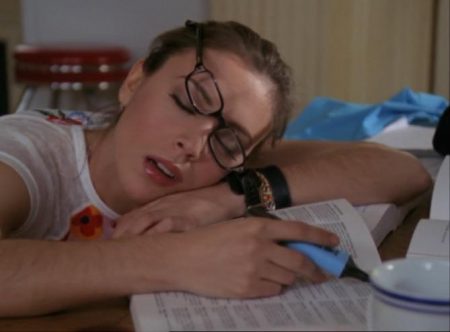Hi, my name is Elke and I am a compulsive overworker.
When I say ‘compulsive’ I literally mean I cannot help myself. I am ‘acting from a compulsion’ as the Oxford English Dictionary defines it. When I work less than 10 hours I feel guilty, after all there is always more to do, more to learn, more to improve. Even going down to 10 hours has been a bit of a struggle: before having children, I was regularly working 12 hours a day. In one year, I regularly came in on my days of annual leave. Now that I have children, I need nearly all my annual leave to cover childcare, so I can’t do that anymore. But, probably, if I didn’t, I would still do crazy things like that.
And that’s the thing to remind myself: it is crazy. I have a job. My contract specifies that I should work 37.5 hours a week. That’s 7.5 hours a day. By working 10, I regularly work 2.5 hours more than I should do. That means that every third day I have worked an additional day for free. By the end of the year, this translates to 75 days a year that I have worked for free. In other words, I work more than twice my holidays for free.
There are two points to consider regarding this. First, why do I do that?
Well, the answer is complex, but let me start with something that is probably staring you directly in the face: we (nearly) all do it. A few years ago, Catherine Johnson discussed this in relation to discourses of attachment (‘Do what you love’) which constantly blur the lines between work and leisure. We ‘work ourselves to death’, she argued, because our work was constantly framed as something we loved, and who wouldn’t want to work more on something they love? As she highlighted, whilst discourses of self-care seem to individualise the responsibility of overwork, in an environment where the same discourses also emphasise attachment, such self-care might actually be the most radical step. Karen Boyle agreed, also because the self-care in such an environment would work against a general culture of overwork where successful careers are seemingly built on overwork. In light of the fact that at the end of the day, ‘we are the academy’, a discourse of self-care could be thoroughly disruptive: they highlight to future academics that our and therefore their own well-being matters. That this is not something that aspiring academics find often in the environment in which they study, is made amply clear in this video:
Thus, overwork is visible to everyone inside the academy, and perpetuates the culture which we ourselves find so exploitative and exhausting. Nevertheless, our testimonials can also be motivation to change. Karen Boyle ended her blog with the following words:
“That MeCCSA and CST are providing spaces for the airing of these issues is an important move. We don’t yet have all the answers, but, if we find time out of our (busy) lives to keep this conversation going, maybe we’ll get there.”
That was four years ago. And still we overwork and do little against it.
The culture of overwork is everywhere. Colleagues regularly tell me of the fact that they have worked 12 days without a break, or they evidence that they overwork by sending emails at 11 at night. The mailing lists such as MeCCSA and BAFTSS regularly ping emails in the middle of the night too, suggesting that this culture of overwork is not restricted to my university. Even popular culture creates a direct connection between studying and overwork, as this image from Charmed (season 2’s ‘Ex Libris’) makes visible:
In the UK, such behaviour also expands to other sectors. One of the most notorious for overworking is the industry that we are all so passionate about, namely TV. 14-hour working days are normal. Working six days a week is normal. As my colleague Perelandra Beedles highlighted in a paper she gave at the last Critical Studies in Television conference, this has obvious detrimental effects on the ability of women to stay in the industry once they decide to have children. Her findings are backed up by research conducted by BECTU, the media and entertainment union, which in 2017 published the Eyes Wide Shut report which has led to a sustained campaign against long working hours under the same name. So, it’s perhaps no surprise that we follow suit. But it’s not as if our colleagues in other departments were any better. Indeed, a report by the UCU – the British University and College Union who represent us – shows that workloads have become unmanageable for a variety of different reason. We overwork, the UCU suggests, not because we act from a compulsion, but because there is too much to do. And let me be honest: I do think that’s the case for me as well.
I call it micromanagement from the very top. In the UK, we have shifted to systems of constant oversight and assessment: the REF (Research Excellence Framework) assesses our research and if it has any impact (often thought of as economic or societal, but interestingly never in terms of knowledge…). Now the TEF (Teaching Excellence Framework) assesses if our teaching is any good. Of course, the government is not sending in any people to observe our teaching; no, our teaching is assessed, in overly simplified terms, by our students and if these students can get a well-paying job after their degree. Whilst others have already pointed to the significant problems connected to these forms of assessment (see for example Wood and Feng, 2017), what I want to add here is that because we are now assessed for nearly everything we do, we also constantly have to prove ourselves: provide evidence of our excellence at all times. This includes countless rounds of internal and external assessments, but also our constant work to collect this evidence. All of this is time-consuming and takes me away from other jobs that are more important to me and that are really the defining jobs of my work, namely actual research and dealing with the students.
Speaking of the students, and I bet it’s the same with you, they have also become a bit more time-consuming. On a really positive level, mine have become much more aware of the support mechanisms, including tutorials. This is great as I have a very different relationship now with them than I had a decade ago. And their work is also noticeably better. On a less positive level, and we know this is wide-spread, there are also significantly more problems that need to be dealt with. The biggest issue is mental health. Indeed, common mental health problems are now much more prevalent than they were a decade ago (Johnson and Crenna-Jennings, 2018). This means offering different forms of support to a greater number of students, including alternative assessments, support meetings, etc. etc. Importantly, dealing with constant student problems also demands a lot of emotional labour, and that is pretty exhausting.
So, there is more work to do, and we are constantly being assessed for it, while we also have a lot of exhausting emotional labour to perform. Which takes me to my second concern: what is the effect of this constant overworking on my and more generally our mental health?
A few years ago, after coming back to work after having my first child, being sleep deprived (he didn’t sleep through until he was nearly 4) and very overworked, I nearly got to the stage of a burn- out. In my case, it manifested in rage: I was angry all the time. Thankfully, the summer came and I was able to make use of workplace counselling. But burnouts are wide-spread amongst higher education staff (Watts and Robertson, 2010). Indeed, 43% of us, a survey conducted in 2017 (Gorczynski, Hill and Rathod) indicated, showed signs of at least a mild mental disorder. In other words, if you are okay, your next-door neighbour or the person that you share your office with probably isn’t. And I bet you know someone amongst your colleagues who is really struggling. And of course this translates, in many cases, into having to deal with a struggling co-worker – on top of students’ needs and rounds of assessment.
What are we doing to ourselves? Why are we willing to do this?
I don’t believe there will be one answer. But I know that when I read the news of Dr Malcom Anderson’s death due to suicide, I realised that I wanted to do something. On top of the mental health crisis that we have in the higher education sector in the UK, we also have a situation of continuous underfunding of mental health services. So, I wanted to make a bit of a difference by raising money for Mind, which is a mental health charity in this country. I wanted to do this by a) working to contract for two weeks – which in the light of my compulsive overworking will be a challenge in itself. But I also wanted to b) observe the impact of working to contract on my mental health. I will do this as a practice of mindfulness, as part of a larger practice of letting my compulsion go. And I will blog about this daily. To catch up on these blogs, or if you are willing to support the fundraiser, find me on my Just Giving page, or indeed on the website of Mind Manchester directly.
Elke Weissmann is Reader in Film and Television at Edge Hill University. She is currently considering changing this to Reader in Television and Film, however. Her books include Transnational Television Drama (Palgrave) and the edited collection Renewing Feminisms (I.B.Tauris) with Helen Thornham. She sits on the board of editors for Critical Studies in Television. She migrated to the UK in 2002 after realising that German television was as bad as she remembered.





